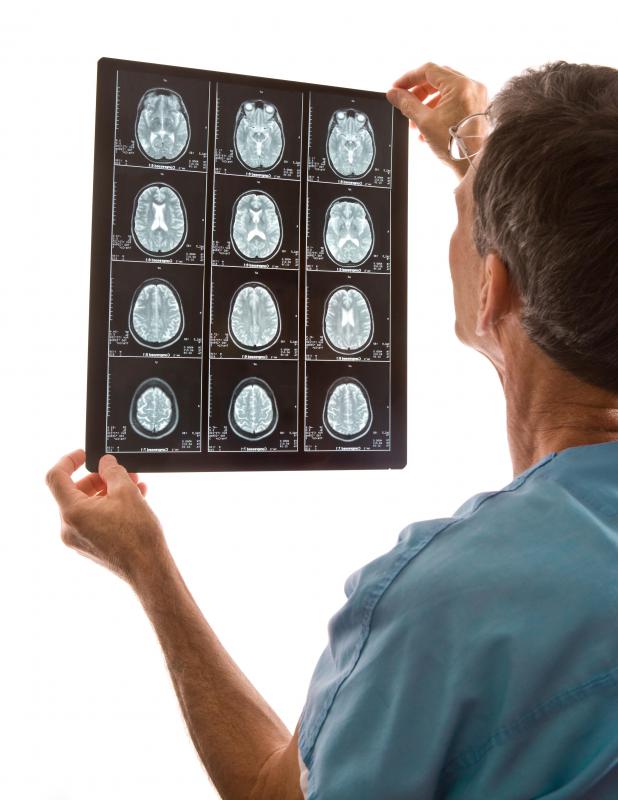At WiseGEEK, we're committed to delivering accurate, trustworthy information. Our expert-authored content is rigorously fact-checked and sourced from credible authorities. Discover how we uphold the highest standards in providing you with reliable knowledge.
What is a Cerebral Lesion?
A cerebral lesion refers to any type of abnormal tissue found on the brain, particularly the area of the brain known as the cerebrum. The cerebrum constitutes the largest portion of the brain and is responsible for allowing voluntary movements within the human body. The ability to make plans, for example, is made possible by this area of the brain, and intelligence levels and personality are determined here as well. Abnormal tissue, or lesions, in this area of the brain, can have profound impacts on these functions.
Lesions occur when there has been damage to the affected tissue. This damage can occur due to some sort of injury, but the development of lesions can also take place during natural disease progression, as in the case of conditions such as multiple sclerosis. Immune system disorders and exposure to certain chemicals have also been reported to cause lesions in the body.

Neck pain and headaches are common when a cerebral lesion is present. Some other possible symptoms include the development of seizures, memory loss, or personality changes. Nausea and fever have also been reported in some cases. Since some of the symptoms of a cerebral lesion can mimic other conditions, any of these concerns should be reported to a medical professional right away.

An abscess is one type of cerebral lesion. This type of lesion tends to develop after some sort of infection. Sinus or dental infections are particularly prone to causing this type of lesion. Without immediate medical attention, an abscess can rapidly become life-threatening.
In diseases causing dementia, such as Alzheimer's, a lesion can be devastating to both the patient and family. With this type of organic disorder, nerve cells in the brain actually die. When this occurs, significant areas of the brain are left with severely damaged tissue. This can lead to a host of mood and personality changes, leaving the patient as well as loved ones feeling helpless and confused.

An AVM, also known as an arteriovenous malformation, is yet another type of cerebral lesion. This type of abnormality presents in the early developmental stages of life. When the veins and arteries in the brain are beginning to form, they become tangled and connected to one another. This causes the vessels to become very weak and prone to rupture. Blood supply to the brain may not be sufficient when an AVM is present due to the weakness of the blood vessels, leading to improper brain function.
AS FEATURED ON:
AS FEATURED ON:


















Discussion Comments
@alex94- Treatment options depend greatly on what type of brain lesion it is. The main goals during treatment are to relieve symptoms, provide a cure, or to improve the quality or duration of life.
In some cases, the lesions are found accidentally and the patient is not presenting with any significant symptoms. Those types are often left alone and closely monitored. If it starts causing problems or symptoms start to develop, other options are then looked at.
There is also the option of surgically removing the lesion, if possible. With new technology, we are now able to get to the “hard to reach” areas of the brain.
Medications are often given to prevent or fight infections and to calm the immune system down.
Is there a cure or any type of treatment for these brain lesions?
Several years ago while working as a paramedic, I encountered a patient with very odd symptoms. She had a terrible headache and then started screaming at me and told me that she was possessed by the devil. She was trying to hit my partner and I and her husband said that she was definitely not herself.
I followed up on her a couple of weeks later and found out that she had a brain lesion. It was very sad because she is 42 years old and works as a 5th grade math teacher.
Post your comments